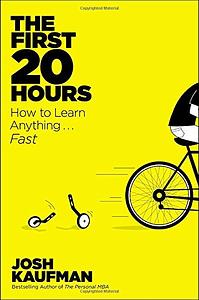You need to sign in or sign up before continuing.
Take a photo of a barcode or cover
I feel hoodwinked.
The promise of this book and what it actually delivers are worlds apart. And for that, I am furious.
The main idea is basically that nobody has time for the 10,000 hour rule popularised by Malcolm Gladwell. Most of us want to learn new and interesting skills, not to be elite world class practitioners of those skills, but for fun, out of interest or to help us do something else.
Enter the concept of rapid skill acquisition.
Josh Kaufmann proposes that it only takes about 20 hours of very focused practice to become proficient at a new skill at a level above amateur. Fair and fine.
My gripe is that the author doesn't really expand on this. Sure, he lays out the principles of rapid skill acquisition and how to learn effectively, but the majority of the book describes his process of learning various disciplines. This would be fine if you're interested in stuff like yoga, windsurfing or playing the ukelele. I am not. As a result, only the first 20-30 pages were of any use to me.
While I like the concept and will probably try it for myself, I don't think this book should have been a book. A series of blog posts would have done the trick.
Instead of reading this whole book, I'd actually recommend watching Kaufman's brilliant Ted Talk on the subject here: https://www.youtube.com/watch?v=5MgBikgcWnY
This pretty much covers the key aspects of everything he talks about in the book and is only 20 minutes long.
The promise of this book and what it actually delivers are worlds apart. And for that, I am furious.
The main idea is basically that nobody has time for the 10,000 hour rule popularised by Malcolm Gladwell. Most of us want to learn new and interesting skills, not to be elite world class practitioners of those skills, but for fun, out of interest or to help us do something else.
Enter the concept of rapid skill acquisition.
Josh Kaufmann proposes that it only takes about 20 hours of very focused practice to become proficient at a new skill at a level above amateur. Fair and fine.
My gripe is that the author doesn't really expand on this. Sure, he lays out the principles of rapid skill acquisition and how to learn effectively, but the majority of the book describes his process of learning various disciplines. This would be fine if you're interested in stuff like yoga, windsurfing or playing the ukelele. I am not. As a result, only the first 20-30 pages were of any use to me.
While I like the concept and will probably try it for myself, I don't think this book should have been a book. A series of blog posts would have done the trick.
Instead of reading this whole book, I'd actually recommend watching Kaufman's brilliant Ted Talk on the subject here: https://www.youtube.com/watch?v=5MgBikgcWnY
This pretty much covers the key aspects of everything he talks about in the book and is only 20 minutes long.
informative
fast-paced
All nonfiction March: Book 2
I've always found it easy to acquire new skills; I don't why I'm reading this. I just wanna see what the author has to offer in this book. I have low expectations, though.
..........
2.5 stars
Not really useful
I've always found it easy to acquire new skills; I don't why I'm reading this. I just wanna see what the author has to offer in this book. I have low expectations, though.
..........
2.5 stars
Not really useful
First three chapters are really useful, remainder of the book are examples, which I found a bit less useful. The premise/idea of rapid skill acquisition is interesting. Worth reading.
hopeful
informative
fast-paced
Honestly all the useful information in this book is the first few chapters which is less than 40 pages. All of that is pretty much common sense or someone else’s research, nothing in the actual theory of the book is original.
There are websites online that summarise the worthwhile parts of the book into a few pages. If you read those summaries you won’t miss anything worthwhile.
There are websites online that summarise the worthwhile parts of the book into a few pages. If you read those summaries you won’t miss anything worthwhile.
informative
fast-paced
I found this a frustrating read. The basic principle is fine but frustratingly light on details.
I didn’t enjoy this book as I found it repetitive. I listened to this book on Headway, which this may be why, but I didn’t feel like I learnt anything from this. I may look into buying the book to see if it is any better, and see if I can learn anything but it wasn’t the best book.
challenging
informative
reflective
medium-paced
This book contains pretty much the things everyone already knows or should know. It is obvious that you have to start with the basics when learning or acquiring a new skill. It is up to you, then, to try to discover what is it all about, or you can go the extra mile and master it, by going beyond the fundamentals of your area of interest. I go after the principle "figure it out" and let my spontaneous decisions decide whether I want or not to further continue gaining knowledge about the desired topic.





